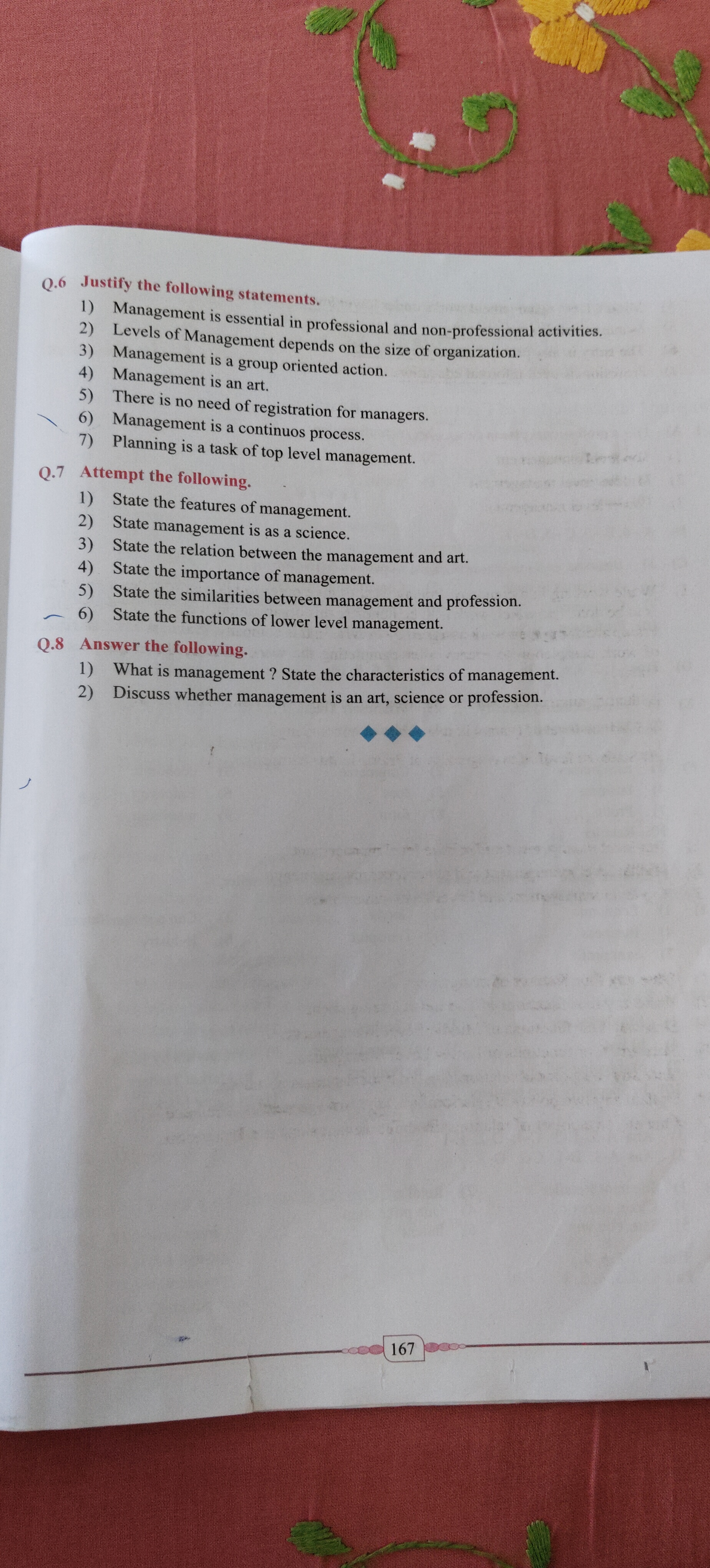Justify the following statements: 1) Management is essential in professional and non-professional activities. 2) Levels of Management depend on the size of organization. 3) Managem... Justify the following statements: 1) Management is essential in professional and non-professional activities. 2) Levels of Management depend on the size of organization. 3) Management is a group oriented action. 4) Management is an art. 5) There is no need of registration for managers. 6) Management is a continuous process. 7) Planning is a task of top level management. Attempt the following: 1) State the features of management. 2) State management is as a science. 3) State the relation between management and art. 4) State the importance of management. 5) State the similarities between management and profession. 6) State the functions of lower level management. Answer the following: 1) What is management? State the characteristics of management. 2) Discuss whether management is an art, science or profession.

Understand the Problem
The question is asking for justifications for various statements regarding management and its principles. It also includes several tasks related to the features of management, its nature as a science, and the functions of different levels of management.
Answer
Management organizes resources, varies by organizational size, and involves creativity and skill. It's continuous and group-focused, requiring no formal registration, with top-level management handling planning.
- Management is essential because it organizes resources efficiently in various activities. 2. Levels of management vary with organizational size to ensure effective control and coordination. 3. It is group-oriented, focusing on teamwork and collaboration. 4. Management as an art requires creativity and skill in decision-making. 5. Managers aren't registered like professionals, but their skills are validated through experience. 6. Continuous adaptability is crucial in management for responding to changes. 7. Top-level management focuses on strategic planning.
Features of management include planning, organizing, staffing, directing, and controlling. It has characteristics such as goal-oriented, pervasive, multidimensional, continuous, group activity, and dynamic. Management as a science relies on systematic knowledge and principles. The art aspect involves personal styles and creativity. Management is also a profession requiring specific skills and responsibility.
Importance: Enhances efficiency, adapts to change, creates a dynamic organization, and ensures resource utilization. Similarities with profession: Specialized knowledge and adherence to ethical codes. Lower-level management functions include supervision, ensuring quality, addressing grievances, and training employees.
Answer for screen readers
- Management is essential because it organizes resources efficiently in various activities. 2. Levels of management vary with organizational size to ensure effective control and coordination. 3. It is group-oriented, focusing on teamwork and collaboration. 4. Management as an art requires creativity and skill in decision-making. 5. Managers aren't registered like professionals, but their skills are validated through experience. 6. Continuous adaptability is crucial in management for responding to changes. 7. Top-level management focuses on strategic planning.
Features of management include planning, organizing, staffing, directing, and controlling. It has characteristics such as goal-oriented, pervasive, multidimensional, continuous, group activity, and dynamic. Management as a science relies on systematic knowledge and principles. The art aspect involves personal styles and creativity. Management is also a profession requiring specific skills and responsibility.
Importance: Enhances efficiency, adapts to change, creates a dynamic organization, and ensures resource utilization. Similarities with profession: Specialized knowledge and adherence to ethical codes. Lower-level management functions include supervision, ensuring quality, addressing grievances, and training employees.
More Information
Management effectively coordinates resources towards specific goals, blending systematic science with personalized artistic approaches. Understanding its importance enhances organizational effectiveness.
Tips
A common mistake is not recognizing the overlap between art, science, and profession in management, which leads to a holistic perspective.
Sources
AI-generated content may contain errors. Please verify critical information